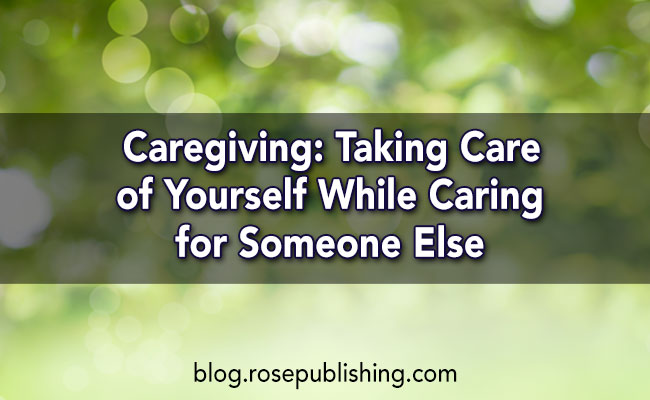Guest post by author Debbie Barr

In 2014 I began a new job that would have a profound impact on my life. As the new coordinator of a memory counseling program at a local hospital, I soon developed relationships with many caregivers—usually a husband or wife caring for their spouse or an adult child caring for a parent with some type of dementia. As I interacted with these caregivers one-on-one in the office, on the phone, and in support groups, I developed great empathy and a profound respect for those engaged in the labor of love we call caregiving. I’ve come to realize that caregiving is one of the most difficult—and most important—jobs in the world. And that’s true whether the cared-for person has dementia, a long-term condition such as Parkinson’s disease, or is recovering from an accident.
Caregiving has been described as a journey. It’s not the “traveling-from-one-place-to-another” kind of journey. It’s a journey of compassion, walking alongside someone coping with illness or disability or the effects of aging. But caregiving is never just about the person needing care. No matter who a person is caring for, or why, or for how long, the caregiving journey is always also about the caregiver. This is the key message of my book, Caregiving: Taking Care of Yourself While Caring for Someone Else. I wrote this book because while most caregivers do a spectacular job of taking care of their loved one, far too many do a terrible job of taking care of themselves.
Well-meaning caregivers sometimes sacrifice their own physical, emotional, social, and other needs so they can pour all their energy and devote all their time to the person in their care. While that sounds noble and loving, it’s really not. It actually puts the cared-for person at risk. In the book, I challenge caregivers to rethink the importance of self-care, telling them:
Here’s the truth. If you ignore your own needs for restful sleep, healthy food, exercise, medical care, spiritual nurture, and “time off,” sooner or later, you will be unable to go on meeting the needs of the person in your care. Unless you make caring for yourself a top priority, you may burn out or bail out. And where would that leave the person you’re caring for?
Do you know a caregiver who feels that self-care is “selfish”? If so, I hope you will share this message with them: self-care isn’t selfish at all; it’s an investment that will be repaid in a better quality of life for the caregiver and a better quality of care for their loved one. Self-care isn’t just smart—it’s necessary!
Caregiving: Taking Care of Yourself While Caring for Someone Else
Packed with practical advice, diagrams, statistics, photos, quizzes, and scannable outlines, this compact guide to caregiving is easy to read and gives you key information at a glance. Get expert knowledge distilled into easy-to-follow steps and apply them immediately to refresh and recharge your caregiving journey.
Enjoy having:
- Trustworthy advice for both seasoned and new caregivers (and everyone in between)
- A Scale of Burden quiz to assess your current level of self-care
- 12 Signs of Stress & specific steps to manage them (PLUS: 3 happiness boosters for caregivers)
- How to Build Your Team: step-by-step instructions to get help (and exactly what to say)
- And much more
Caregiving is draining—emotionally and physically. From changing bandages and diapers, to managing medical appointments and picking up prescriptions, caregiving can feel like an endless journey. But here’s the great news: the caregiving experience doesn’t have to be like that. When caregiving tasks are shared and caregivers understand how to take good care of themselves too, the whole experience can be much brighter for everyone.
Trusted Help for Caregiving from Those Who’ve Been There
In Caregiving: Taking Care of Yourself While Taking Care of Someone Else, award-winning author and speaker, Debbie Barr, writes with compassion and understanding, taking an honest look at the ups and downs of caregiving. She shares the real-life experiences of caregivers and the things they’ve learned along their journeys. This book will help caregivers like you know how to gather a team to help shoulder the caregiving load. You will be able to:
- Identify when you’re nearing burnout
- Discover the help available to you (and what to say)
- Take specific action steps to cope wisely and learn to thrive
- Know when the caregiving needs to change (and why it DOESN’T mean failure)
Key Features of Caregiving: Taking Care of Yourself While Taking Care of Someone Else
Caregiving will provide everything you need—from the basics to step-by-step details—to not only get you started on your journey, but to make the most out of your time and talents. Key features include:
- Reliable—Award-winning author and speaker Debbie Barr unpacks real-life experiences and seasoned advice into trustworthy nuggets of caregiving gold you can carry with you throughout your day. Get refreshed and revitalized with compassion and truths from those who have experienced the emotions and journeys you are going through.
- Quick and Easy-to-Use—Caregivers rarely feel like they have time for themselves, so this guide has been designed with a busy schedule in mind: packed with concise summaries, scannable outlines and visuals, and distilled step-by-step instructions, you can absorb everything you need with as little or as much time as you have.
- Practical—Whether you need to apply a self-care routine, build a care team to support your loved one in need, or make a big change in your care plan, get concise step-by-step instructions (including exactly what to say) and start immediately!
- Flexible—A little or lots of time. Brand new or seasoned caregiver. Short- or long-term care. Regardless of your situation, this handy minibook has practical applications for everyone.
Caregiving is never just about the person needing the care; it’s about the caregiver too. You will come away from this book encouraged and equipped to face the caregiving journey with hopefulness and peace of mind.



